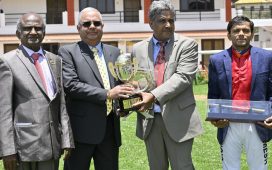An excess of water-soluble carbohydrates (WSC), a major component in nonstructural carbohydrates, can present a risk for horses prone to pasture associated laminitis or some other metabolic conditions. Determining WSC concentrations in commonly grazed cool-season grasses, at different times of day and under different fertilization treatments, can help optimize grazing times and management strategies. One goal of this study, conducted at the University of Kentucky, was to explore WSCs of four cool-season grass species.
Multiple cultivars of tall fescue, Kentucky bluegrass, orchardgrass, and perennial ryegrass were sampled every two to four weeks from plots with or without added nitrogen, in the morning and afternoon.
Grass species, nitrogen application, time of day, and harvest date all influenced WSC concentrations. On most harvest dates, perennial ryegrass or tall fescue were highest in WSC; however, WSCs did not exceed 15 percent. The range of WSC concentrations was 5 to 15 percent for perennial ryegrass, 4 to 11 percent for tall fescue, 3 to 9 percent for orchardgrass, and 4 to 13 percent for Kentucky bluegrass. Higher-WSC cultivars included “Aberzest” and “Calibra” perennial ryegrass, “Ginger” Kentucky bluegrass, and “Bronson” and “Cajun II” tall fescue. In total, 86 percent of grasses had higher WSC concentrations in the afternoon than in the morning. In general, average WSC decreased to a minimum in July and then increased, reaching a maximum around mid-October. Additionally, nitrogen fertilization did not have an effect on a majority (79 percent) of grass WSC concentration.
The results suggest that time of day, season, and cultivar choice may be used to help minimize forage WSCs for horses prone to pasture-associated laminitis and other metabolic conditions.
Read more at the University of Minnesota Extension.
New to the Paulick Report? Click here to sign up for our daily email newsletter to keep up on this and other stories happening in the Thoroughbred industry.
Copyright © 2020 Paulick Report.







